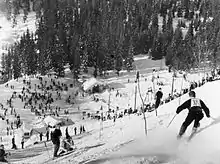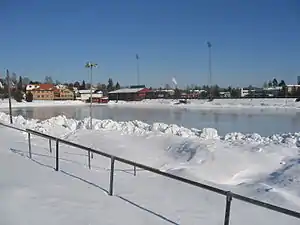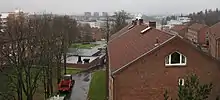Venues of the 1952 Winter Olympics
The 1952 Winter Olympics were held in and around Oslo, Norway, from 14 to 25 February 1952. Ten competition and eight non-competition venues were used, in addition to three designated, but unused, reserve competition venues. Six of the competition venues were located in Oslo, while one each was located in Bærum, Skedsmo, Drammen and Krødsherad. Bislett stadion was the centerpiece of the games, hosting the opening and closing ceremonies, the speed skating and the figure skating. Bislett featured both a 400-meter (1,300 ft) circumference speed skating track and a 60-meter (200 ft) long rink used for figure skating, separated by snow banks.[1] Two reserve venues were designated for the skating events, Tryvann stadion in Oslo and Hamar stadion in Hamar.[2]


Jordal Amfi, an outdoor artificial ice rink,[3] was built with a capacity for 10,000 spectators.[4] This allowed ice hockey to be played on artificial ice for the first time at the Olympics.[5][6] Of the tournament's 36 matches, 23 were played at Jordal, while the remaining were played at Kadettangen in Bærum, Dælenenga idrettspark in Oslo, Lillestrøm stadion in Skedsmo and Marienlyst stadion in Drammen.[2]
The ski jumping, cross-country skiing and Nordic combined events were held at Holmenkollbakken, 8 kilometers (5 mi) from the city center.[7] Although upgraded several times since its opening in 1892, the former wooden superstructure was replaced with a concrete tower and in-run ahead of the Olympics, with the out-run being extended to 87 meters (285 ft).[8] Stands were erected to seat 13,000 people, with capacity for an additional 130,000 standing spectators at the base of the hill.[9] Cross-country races started and ended at the base of the ski hill.[10] A switchboard was posted at the start and finish lines to help spectators monitor the progress of the competitors during the races.[11] Most of the stands built for the ski jumping competition had to be removed for the cross-country races. As a result, there was little room for spectators to sit and watch the cross-country events. Spectators were therefore allowed to walk within the course.[10]
The alpine skiing events were split between Rødkleiva, located in Oslo near Holmenkollen, and Norefjell, located at Krødsherad, 113 kilometers (70 mi) from Oslo and the only venue outside Greater Oslo.[12] Rødkleiva featured the slalom events, with an elevation difference on the hill of 200 meters (660 ft) and a course length of 480 meters (1,570 ft).[13] Downhill and giant slalom, the latter of which was making its Olympic debut, were competed at Norefjell.[12] Considerable construction and upgrades were made to the area to make it suitable for Olympic competition. A bridge was built across the lake of Krøderen to help with transportation concerns; a new hotel, two ski lifts, and a new road were also constructed.[13]
There was no permanent bobsleigh run in Norway as there was very little interest in the sport.[14] The organizers decided to build a temporary course, Korketrekkeren, out of snow,[15] which ran down the hill from Frognerseteren, near Holmenkollen. The course was 1,508 meters (4,948 ft) long and featured 13 turns.[16] The run was built and tested in 1951, and was rebuilt in 1952 in time for the Olympics.[15]
Competition venues

The following list contains the ten venues used for competitions during the 1952 Winter Olympics. They are listed by their name, as well as containing the sports held at the venue, the municipality where they are located and the spectator capacity.
| Venue | Location | Sport(s) | Capacity | Ref |
|---|---|---|---|---|
| Bislett stadion | Oslo | Bandy, figure skating, speed skating | 27,000 | [17] |
| Dælenenga idrettspark | Oslo | Bandy, ice hockey | 5,000 | [18] |
| Holmenkollbakken | Oslo | Cross-country skiing, Nordic combined, ski jumping | 149,000 | [17] |
| Jordal Amfi | Oslo | Ice hockey | 10,000 | [2] |
| Kadettangen | Bærum | Ice hockey | — | [2] |
| Korketrekkeren | Oslo | Bobsleigh | 12,000 | [18] |
| Lillestrøm stadion | Skedsmo | Ice hockey | — | [2] |
| Marienlyst stadion | Drammen | Ice hockey | 5,000 | [18] |
| Norefjell | Krødsherad | Downhill, giant slalom | 8,000 | [18] |
| Rødkleiva | Oslo | Slalom | 15,000 | [18] |
Reserve venues

Three reserve venues were designated, should the weather not make it possible to hold events in Oslo. The following list contains the venue, the municipality they are located in, and the events for which they were designated.
| Venue | Location | Sports | Ref |
|---|---|---|---|
| Hamar stadion | Hamar | Ice hockey | [19] |
| Tryvann stadion | Oslo | Ice hockey | [19] |
| Voss | Voss | Alpine skiing | [19] |
Non-competition venues

The following is a list of the eight non-competition venues for the Olympics. This includes the name of the venue, the municipality in which it is located and its purpose.
| Venue | Location | Purpose | Ref |
|---|---|---|---|
| Bislett stadion | Oslo | Opening and closing ceremonies | [1] |
| Fjeldhvil Hotel | Krødsherad | Billeting quarters (participants) | [20] |
| Hotel Viking | Oslo | Billeting quarters (media) | [20] |
| Ila | Oslo | Billeting quarters (participants) | [20] |
| Norefjellstua | Krødsherad | Billeting quarters (participants) | [20] |
| Sandum Seter | Krødsherad | Billeting quarters (participants) | [20] |
| Sogn Student City | Oslo | Billeting quarters (participants) | [20] |
| Ullevål University Hospital | Oslo | Billeting quarters (participants) | [20] |
Post-Olympic use
Bislett remained a speed skating venue until 1988, after which it only hosted athletics and football.[21] Between 1925 and 1986, it saw 13 world championships and 10 European championships in speed skating. The structure was demolished and replaced with a new stadium in 2005.[22] It hosts the annual Bislett Games, now part of the Diamond League in athletics.[21] Marienlyst is used as a football stadium, and hosts both Strømsgodset IF and the Norway national under-21 football team.[23][24] Lillestrøm, Dælenenga and Kadettangen are only used for lower-level football, as they lack any significant spectator stands.[25][26][27] Jordal Amfi received a roof in 1972 and hosted the World Ice Hockey Championships in 1958 and 1999.[28][29] Holmenkollbakken has been rebuilt several times since the Olympics; most recently it was entirely rebuilt in 2010. The complex has received a ski stadium, collectively known as Holmenkollen National Arena.[30] In addition to the annual Holmenkollen Ski Festival, the hill hosted the FIS Nordic World Ski Championships in 1930, 1966, 1982 and 2011.[31][32][33][34]
References
- Organising Committee for the VI Winter Olympic Games (1952): 28
- Organising Committee for the VI Winter Olympic Games (1952): 31–32
- Organising Committee for the VI Winter Olympic Games (1952): 30
- Organising Committee for the VI Winter Olympic Games (1952), p. 31
- "1952 Oslo Winter Games". Sports Reference LLC. Archived from the original on 17 April 2020. Retrieved 26 August 2010.
- Findling and Pelle (1996): 256
- Organising Committee for the VI Winter Olympic Games (1952): 32
- Organising Committee for the VI Winter Olympic Games (1952): 32–33
- Organising Committee for the VI Winter Olympic Games (1952): 33
- Organising Committee for the VI Winter Olympic Games (1952): 34
- Organising Committee for the VI Winter Olympic Games (1952): 35
- Ringstad, J. "Telecommunications for the VI Olympic Winter Games, Oslo 1952" (PDF). Telenor. Archived from the original (PDF) on 8 March 2012. Retrieved 23 July 2019.
- Organising Committee for the VI Winter Olympic Games (1952): 35–36
- Organising Committee for the VI Winter Olympic Games (1952): 38
- Findling and Pelle (1996): 254
- Organising Committee for the VI Winter Olympic Games (1952): 39
- Organising Committee for the VI Winter Olympic Games (1952): 97
- Organising Committee for the VI Winter Olympic Games (1952): 98
- Organising Committee for the VI Winter Olympic Games (1952): 41
- Organising Committee for the VI Winter Olympic Games (1952): 42
- Eriksen and Greve (1995): 110
- "Historikk" (in Norwegian). Bislett Stadion. Archived from the original on 10 September 2011. Retrieved 19 August 2011.
- Sivertsen, Ole (20 June 2011). "England-talenter til Marienlyst". Drammens Tidende (in Norwegian). Archived from the original on 29 March 2012. Retrieved 19 August 2011.
- Nilsen, Magne J. (10 June 2009). "Tom Berntzen gleder seg til nytt Marienlyst stadion". Drammens Tidende (in Norwegian). Archived from the original on 29 March 2012. Retrieved 19 August 2011.
- "Idrettsanlegg" (in Norwegian). Skedsmo Municipality. Archived from the original on 28 August 2011. Retrieved 19 August 2011.
- "Kadettangen (idrettsanlegg i Bærum)". Budstikkas store Asker og Bærum-leksikon (in Norwegian). Budstikka. 5 March 2011. Archived from the original on 13 September 2011. Retrieved 19 August 2011.
- "Dælenenga idrettspark" (in Norwegian). Oslo Municipality. Archived from the original on 20 July 2011. Retrieved 19 August 2011.
- Eriksen and Greve (1995): 81
- "Ishockey-VM i rute" (in Norwegian). Norwegian News Agency. 21 January 1999.
- Association for the Promotion of Skiing. "Alt om bakken". Archived from the original on 9 March 2011. Retrieved 3 March 2011.
- Thoresen (2007): 61
- Vaage and Kristensen (1992): 165
- Vaage and Kristensen (1992): 183
- "Kollen kan rives til VM". Adresseavisen (in Norwegian). 26 May 2006. p. 28.
Bibliography
- Eriksen, Arvid; Greve, Jan (1995). Norske idrettsanlegg (in Norwegian). Oslo: Norwegian Ministry of Culture. ISBN 82-90773-06-4.
- Findling, John E.; Pelle, Kimberly D. (1996). Historical Dictionary of the Modern Olympic Movement. Westport: Greenwood Publishing Group. p. 258. ISBN 0-313-28477-6. Retrieved 25 August 2010.
1956 winter olympics.
- Organising Committee for the VI Winter Olympic Games (1952). Olympic Winter Games Oslo 1952 (PDF). Oslo. Archived from the original (PDF) on 30 September 2007. Retrieved 12 June 2012.
{{cite book}}: CS1 maint: location missing publisher (link) - Thoresen, Arne (2007). Lengst gjennom lufta (in Norwegian). Oslo: Versal. ISBN 978-82-8188-030-6.
- Vaage, Jakob; Kristensen, Tom (1992). Holmenkollen: historien og resultatene (in Norwegian). Stabekk: De norske bokklubbene. ISBN 82-525-1678-5.